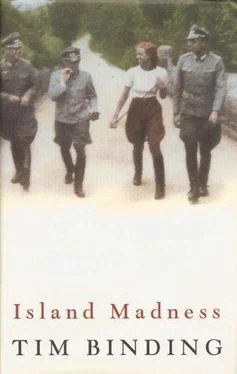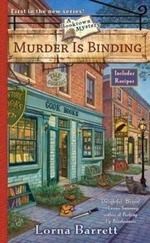Veronica took the boy to the door. She tapped her wrist.
“At night,” she said. “ Nacht . This door. Open.” She swung it to and fro. “You komm hier . For food. Yes?”
“Yiss.”
“Good. Sehr gut .”
The boy smiled quickly again. She took his head and held it against her. He turned, and ran out into the dark.
Her father was sitting at the table, smoking the stub end of a roll-up.
“Dangerous game you’re playing, girl,” he said.
“Him? He won’t talk.”
Her father shook his head.
“Not him. I mean that.” He pointed to the greatcoat. “No good’ll come of it.”
“No? What about you up at the airport?”
“That’s different. Working for them is one thing. We’ve no choice in the matter. Having… relations is another.”
“Well, excuse me for living. And where do you think those fighters are going? Butlin’s Holiday Camp? You can see the bombers circling waiting for their escort, for Christ’s sake. That’s what you’re doing, Dad. Helping bomb London.”
Her father’s face darkened with anger.
“You don’t know the half of it, girl. I know what I’m doing and I know what you’re doing. You should have stuck with Tommy Ie Coeur. There’d be none of this nonsense then.”
“Tommy was going with every tart he could lay his hands on!”
“Well, you must have given him a taste for them, that’s all I can say.”
“Da!”
“I mean it. Thank God your mother can’t see it all.”
“I’ll move out if you like.”
“It might come to that.”
He trudged back upstairs. Veronica opened the back door and walked out into the garden, down to the field at the end, wondering if the boy had got back home safely. Home! She sighed at the impossibility of the word and feeling the tears rise up, held on to the railing and let her body shake.
Reaching the top of the hill Ned stopped and looked down. Though the moon shone full, it was a winter moon, one that bled the island of all colour. On the shoreline, a mass of shapes stood out against the sky, a gravel digger, its half-open jaw towering over the silhouette of a Henschel locomotive with its string of empty wagons. Closer by, the pocket of houses where he had been brought up, once whitewashed every year, but now left to fade in tired sympathy. No one painted their houses any more. Guernsey had a new shade now, occupational grey.
But beyond the bay sparkled. No blackout could hide it tonight, and as it danced, deep and dark, it seemed to restore to the island that sense of floating space that he had long forgotten existed. For a moment he could remember what it had been like before the grey, when the island had rung, not to the sound of marching feet and strident songs, but to sounds that had been banished by decree, sounds an active people made. For they did nothing now except shamble from one day to the next. He stood and listened. Even the tone of the sea had been changed! He could remember how it had been, the rhythm he had slept and woken to, not this slap, slap, slap, as it met thick concrete walls, but the sucking wash of it as it beat its way, back and forth, over the long expanse of pebble and sand. Time was when he would have gone down and dragged the canoe out, now one of the few craft on the island that hadn’t been confiscated or broken up. Not that he’d hidden it, that was the beauty of it. It was a foldaway canoe called a Folboat, eighteen foot long, light but strong enough to carry a load of around 700 Ibs. Dismantled it looked more like a camp bed than anything else and with the paddies hidden among the pitchforks they hadn’t given it a second glance. He’d seen an advert for it seven years ago. 2/6 a week it cost to buy then and he’d done it with the help of dad and a loan from Uncle Albert. He used to take it out regularly on spring nights like this, skimming over the huge stillness of the world, dipping in moonlight on the empty sea. In the summer Veronica came too, the two of them skirting the mute cliffs and motionless bays before she slipped in, swimming on top of the great swell, challenging the cold currents while he described safety’s circle. The island had been theirs then; they had the strength and skill to possess it, to feed in its deep waters, to embrace its age with their surging youth.
An owl called, reminding him of other hoots and chants that once broke this hushed night air; singing his way home with Bernie, their stomachs awash with beer; the skinny-dipping squeals a whole group of them had enticed once out of Veronica and Bernie’s girl and the young Elspeth Poidevin and how they had run back across L’Ancresse Common with freshly glimpsed secrets to take to bed. Everyone grew older, he knew that, and he knew too that it was not the passing of his youth that he regretted, but that it should pass into this, where their movements were constricted not by the island’s history or their own stubborn prejudices but by a homeland which had ceased to exist. For where were they now? What identity did they possess? They listened to the wireless, waiting for messages of hope and exhortation, but though London sent an armada of them to the other occupied countries, none were directed here. England kept quiet about the Channel Islands as if she were punishing the islands for letting the side down. ‘England expects that every man will do his duty’, that’s the phrase he had been taught at school. But what could they do here, with no place to hide, living amongst an enemy who was polite and considerate and bristling with power?
He was careful to make little sound when he got home, but the walk had wakened him, and he did not feel like sleep. He felt hungry and in need of company, and so he knelt down and talked softly to the dog. Jimbo raised his head in attentive affection before settling back to sleep. On the stone shelf in the larder lay five turnip cakes Mum must have made that afternoon and beside them a pile of oatmeal biscuits. There was no bread. The four eggs meant that the chickens were still laying; meant that the chickens were still there. Ned had moved them into the washroom at the back, and though the kitchen smelt of them a little, at least they were safe. He took two eggs and bit into a biscuit. He hadn’t eaten properly the whole day.
The iron stove had gone out hours ago, but it would not take long to light. Before the Occupation it would have been kept on all night, burning coal that Dad would have brought back from the builder’s yard, but they hadn’t had any decent stuff since ‘41, just wet sludge from Belgium that seemed to generate everything but heat. Their supply of wood was running low, though they had yet to decide whether to demolish Sally’s old pen and use it for fuel. He opened the front of the stove and shoved a couple of small logs on top of a small pile of kindling. Pulling the pan down from its hook, he cracked in the eggs and waited for the heat to come through. There was still some tea in the caddy left over from Uncle Albert’s weekly visit, and though he felt guilty making a pot solely for himself, he put the kettle on. He needed some comfort.
While the eggs were cooking he moved into the other room and sat in the armchair where Dad used to sit bathing his feet, waiting for his supper. Though the light in the kitchen was weak, it shone clear through. Ned couldn’t help but look. This was where he had been brought up, this tiny cottage, the downstairs room, the kitchen, the outside lav and the two rooms upstairs. He had been right to get out, whatever Dad had thought, and now he was back again. Back and alone and without a future. How familiar it looked, and yet how strange that this might turn out to be his whole life; the red carpet brought back from one of the big houses before he had been born, the French clock Grandad had rescued from some sinking tramp steamer, the warped sideboard with the ashtray from Portland Bill on it, Mum and Dad’s wedding picture propped up behind. What else? A square table, a clean grate, a mirror with the silver backing coming off, the lighthouse doorstop and three easy chairs. He returned to the kitchen, put the pan on the table, pulled the Star out of his pocket and started to read.
Читать дальше












